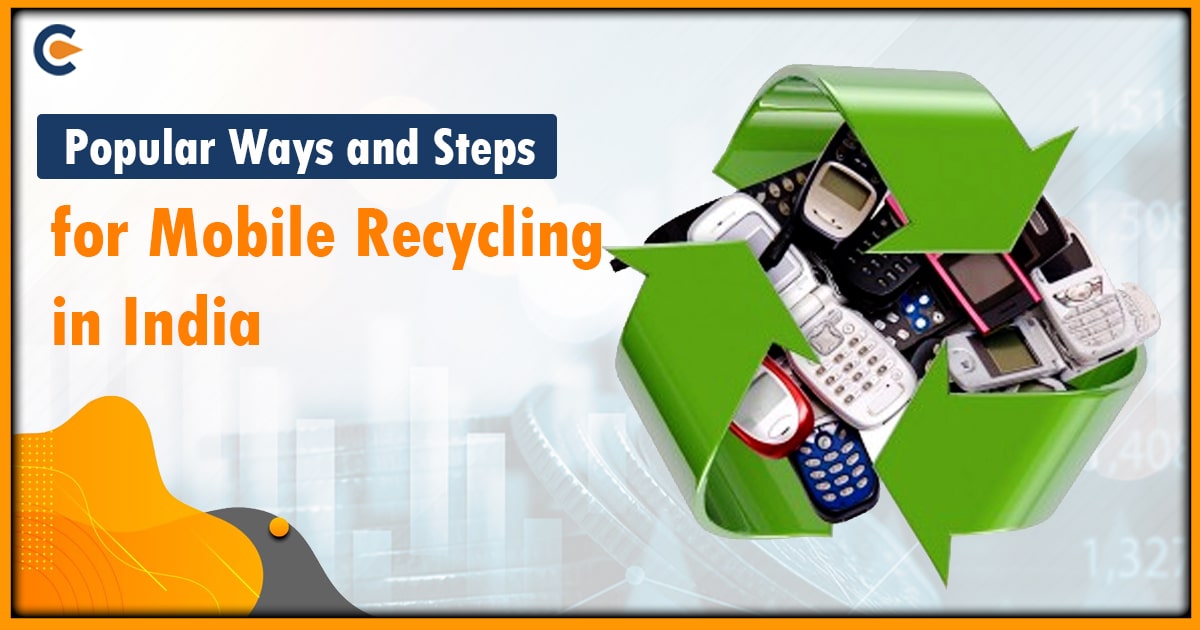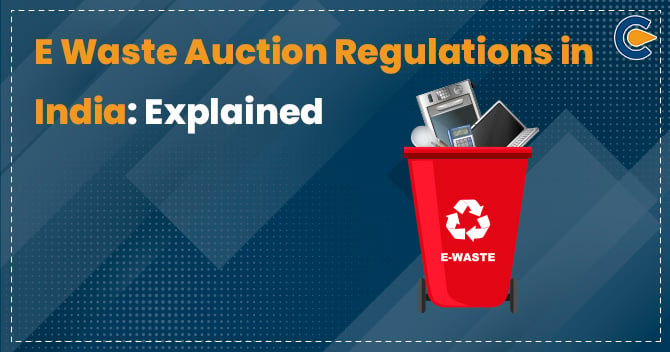Mobile recycling in India refers to the process of collecting, refurbishing, and reusing or disposing of old and unused mobile phones in an environmentally responsible manner. With an increase in electronic waste generated by smartphones’ rapid growth in India, recycling has gained importance.
Mobile recycling in India is an important aspect of e-waste management as there is a requirement for electronic waste management because of the increase in the manufacturing of mobile phones. India is the world’s largest smartphone market, creating massive electronic waste (e-waste). Hence making recycling an important part of the conservation of resources and maintaining the sustainability of the environment.
Collecting, refurbishing, and recycling old or unused mobile phones is involved in recycling mobile phones. It is done so that there is less impact created by discarded electronic devices. If the electronic device is not handled carefully, the hazardous substance will negatively impact the environment and human health.
Key Points mobile recycling in India
Here are some key points about mobile recycling in India:
- Environmental Concerns: Mobile phones contain hazardous materials like lead, mercury, and cadmium, which can harm the environment if not disposed of properly. With the help of practices like recycling, it would reduce the impact on the environment, which is created by e-waste.
- Economic Value: Recycling old mobile phones can recover valuable materials like silver, gold and copper, which can be reused in manufacturing new electronics, reducing the need for mining and resource extraction.
- Government Initiatives: The Indian government has introduced e-waste management rules to regulate the disposal and recycling of electronic waste, including mobile phones. It is the duty of the manufacturer to properly dispose of the products.
- Collection Centers: Many cities in India have established e-waste collection centres or tie-ups with recycling companies to facilitate the safe disposal of old mobile phones and other electronics.
- Consumer Awareness: Awareness campaigns and initiatives have been launched to educate consumers about the importance of recycling their old mobile phones and how to do it responsibly.
- Refurbishment and Resale: Some organisations refurbish old mobile phones and sell them at affordable prices, extending the life of the devices and reducing e-waste.
- Donation: Some individuals and organisations donate old but still functioning mobile phones to underserved communities or non-profit organisations, contributing to digital inclusion efforts.
Ways for Mobile Recycling in India
Mobile recycling in India can be done through various methods to ensure responsible disposal and environmental sustainability. Here are some common ways:
- E-Waste Collection Centers: Many cities and towns in India have established e-waste collection centres where individuals can drop off their old mobile phones and other electronic devices for recycling. The main work of these centres is to properly dispose of e-waste. These centres ensure proper handling and disposal of electronic waste.
- Manufacturer Exchange Programs: Some mobile phone manufacturers and retailers offer exchange programs where customers can trade in their old devices when purchasing new ones. The old phones are typically refurbished or recycled.
- Online Buyback and Recycling Platforms: Several online platforms and mobile apps allow users to sell or exchange their old mobile phones. These platforms often partner with recycling companies to properly handle and dispose of e-waste.
- Retail Store Drop-off: Some electronics retail stores accept old mobile phones for recycling. Customers can simply drop off their old devices at these stores.
- Donation to NGOs: Consider donating your old but still functional mobile phones to non-governmental organisations (NGOs) or charitable organisations that provide devices to underserved communities or for educational purposes.
- Refurbishment and Resale: Some organisations specialise in refurbishing old mobile phones, making necessary repairs, and selling them in the second-hand market. These practices increase the life of the device and help in the reduction of e-waste.
- Corporate Recycling Initiatives: Many companies, especially those in the IT and telecommunications sector, have their own mobile recycling and e-waste management programs. These initiatives make sure that the recycling of old phones is done properly.
- Government Initiatives: Keep an eye on government-led e-waste awareness and collection drives. Periodically, government authorities organise campaigns to encourage citizens to dispose of their e-waste, including mobile phones, through designated channels.
- Reverse Logistics: Some mobile phone companies have reverse logistics systems in place, where they arrange for the collection of old devices from customers’ doorsteps when they purchase new ones.
- Local NGOs and Community Programs: Check if local NGOs or community organisations in your area are running mobile recycling or e-waste collection programs. They may have drop-off points or scheduled collection drives.
Steps for Mobile Recycling in India
Here are the steps for mobile recycling in India:
- Data Backup and Erasure: Before recycling your mobile phone, back up any important data like contacts, photos, and documents. Then, perform a factory reset to erase all personal data from the device.
- Remove Accessories: Take out the SIM card, memory card, and any additional accessories like cases or screen protectors. These items can be reused or disposed of separately.
- Find a Collection Center: Locate a certified e-waste or mobile recycling collection centre near you. Many such centres are there for this purpose. Online and local government bodies have been proven helpful for this purpose.
- Visit the Collection Center: Bring your old mobile phone to the collection centre. This makes sure that the e-waste is recycled properly.
- Exchange Programs: If you’re purchasing a new mobile phone, check if the manufacturer or retailer offers an exchange program. A discount is usually provided on the new phone on giving away the old phone.
- Online Recycling Platforms: Alternatively, you can use online platforms or mobile apps that facilitate mobile recycling. They may offer buyback options or provide instructions on shipping your old device to them.
- Verify Certification: Ensure that the recycling centre or platform you choose is certified and follows environmentally responsible recycling practices. Look for certifications like ISO 14001 or e-Stewards.
- Document the Transaction: If possible, document the recycling transaction and keep records or receipts as proof of responsible disposal.
- Support NGO Initiatives: Consider donating your old but functional mobile phones to non-governmental organisations (NGOs) that can redistribute them to underserved communities or for educational purposes.
- Promote Awareness: Encourage friends and family to recycle their old mobile phones responsibly and spread awareness about the importance of e-waste management.
How to Start a Mobile Recycling Business?
Starting a mobile recycling business involves several key steps:
- Research and Planning: Understand the market demand and competition, and create a solid business plan.
- Legal Requirements: Register your business and comply with environmental regulations.
- Location and Equipment: Find an appropriate facility and invest in the necessary equipment.
- Supply Chain: Develop a network for sourcing used mobile devices.
- Recycling Process: Establish efficient procedures for disassembling and recycling mobile phones, focusing on environmental responsibility.
- Marketing and Branding: Create a strong brand identity and promote your business.
- Data Security: Ensure data security when handling use devices.
- Pricing and Revenue: Determine competitive pricing and explore additional revenue streams.
- Sustainability: Plan for long-term growth and sustainability.
- Customer Service: Provide excellent customer service can help built trust and loyalty.
- Monitoring and Adaptation: Continuously monitor and adjust your strategies to stay competitive and ethical
Authorisation and Licenses Required for Mobile Recycling Business
- Business Registration
- GST Certificate
- MSME Registration
- CPCB EPR Authorisation[1]
- Pollution NOC from SPCB
Common Issues with Mobile Recycling in India
Mobile recycling in India faces several challenges, including:
- Lack of Awareness: Many consumers are unaware of the importance of mobile recycling in India and the environmental hazards associated with improper disposal of electronic waste.
- Informal Recycling Sector: A significant portion of e-waste in India is processed by the informal recycling sector, often in environmentally unsafe conditions, leading to health risks for workers and inadequate recycling practices.
- Limited Collection Infrastructure: there are rural areas that cannot be accessed for proper disposal of mobile phones.
- Economic Incentives: Some consumers may prefer selling their old phones rather than recycling them, as they perceive it as a more profitable option, contributing to e-waste generation that is directed into the informal recycling market.
- Complexity of E-Waste: Mobile phones contain complex components and materials, making recycling processes challenging and requiring specialised equipment and knowledge.
- Counterfeit and Substandard Devices: The market for counterfeit or substandard mobile phones can make it difficult to distinguish genuine devices for profitable and responsible recycling.
- Regulatory Compliance: While regulations exist, compliance and enforcement can be inconsistent, leading to gaps in the implementation of responsible recycling practices.
- Data Security Concerns: Consumers may be hesitant to recycle their mobile phones due to concerns about data security, even after performing factory resets.
- Consumer Behavior: Cultural factors and the desire for the latest technology often drive consumers to discard old devices rather than consider recycling or reuse.
- Limited Corporate Responsibility: Some mobile phone manufacturers and retailers may not actively promote recycling or provide adequate incentives for consumers to participate.
Conclusion
With the rapid growth of the smartphone market, mobile recycling in India is getting attention so that the problems related to the environment, proper e-waste management, and maintaining sustainability are addressed. Many initiatives are taken by the authorities to spread awareness about properly disposing of mobile phones so that there would be a reduction in electronic waste. With the help of these practices, the life cycle can be extended.
FAQs
Collecting, refurbishing, and recycling old or unused mobile phones is involved in the recycling of mobile phones. It is done so that there is less impact created by electronic devices which are discarded.
There are various ways to dispose of a smartphone: giving it to E-Waste Collection Centers, Manufacturer Exchange Programs, Online Buyback and Recycling Platforms, Retail Store Drop-off, Donation to NGOs, refurbishment and resale.
The process of reusing and recovering components and raw materials from used mobile phones is known as mobile phone recycling. It entails disassembling the phone, sorting the reusable components, and selling or donating the non-reusable components to certified recyclers.
In general, refurbished means that a used phone has been professionally inspected to ensure that it is fully functional, that there are no flaws with the cameras, speakers, microphone, or screen, and that the Wi-Fi, Bluetooth, and 4G function properly.
Yes, cell phones are recyclable. Working phones are frequently exchangeable at a cell carrier, manufacturer, or retailer, but many businesses also accept broken or low-value phones for free mail-in recycling. Non-profit organisations also accept cell phones for recycling, with the proceeds going to charitable causes.
The largest e-waste dumping site in India is in the East Delhi suburb of Seelampur. Mumbai is India’s leading producer of e-waste, followed by Delhi, Bengaluru, Chennai, and Kolkata.
India has become the dumping ground for our e-waste, everything from computers, phones, and television. Old Seelampur, in East Delhi’s suburbs, is home to India’s largest e-waste dump yard.
Read Our Article: How Can Businesses Profit From E-Waste Recycling











